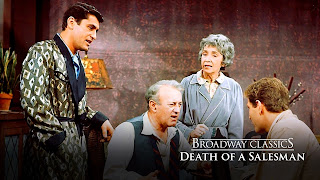Did The Salesman Deserve To Die?
I’ve heard
about this play ever since I’ve read the play The Glass Menagerie by Tennessee
Williams. Now that I have watched the Arthur Miller's play Death of a Salesman (1966) starring
Lee J. Cobb, I cannot wait to share my thoughts. Firstly, I would like to
comment on the stunning performance by Lee J. Cobb as Willy Loman, the
protagonist, the delusional salesman. I had previously watched him in the film 12
Angry Men (please watch it, you’ll thank me later) and here too he does a
great job in depicting emotions that I feel I would have never realized had I read the
play.
The link to the play on YouTube:
https://youtu.be/Y7lGIUzUKOE?si=wmecuYXAsknxNt8X
I shall
try not to spoil it too much for you as I give you a brief summary of the play.
The play introduces us to an ageing salesman, Willy Loman who has just returned
from New York to his middle-class apartment in Boston. His two sons haven’t
found much success in business as he hoped for, and his degrading mental health
is cause for concern in the family. His much successful brother, Ben, is his ever-prevailing
hope for the reality of the American Dream, although he is slowly being forgotten
as the men of his age have already retired or are dead. He recollects instances
of the past where his son seemed to have a bright future in soccer, all while
losing his sanity until a point where Linda suspects him of having suicidal motives.
Now the play mocks the very idea of the American Dream
itself. We see Willy, initially in a state of pride and hopefulness as he
speaks about the ways of business. However, the reader then faces the slap of
reality which Willy never seems to accept, the reality that the ‘dream is long
dead’. Now the little piece of writing brilliance is that all the characters
represent different parts and thoughts of that dream. We have Ben, who “walked
into the jungle at 17 and came out rich in 21”. However he chose to leave the
city to go to Alaska, while Willy believed in his own land of dreams. Then we
have the character of Charlie, perhaps the voice of the audience asking, “Why
must everyone like you”, pointing out the utter delusional state of mind he
lives in. We also have Linda, the wife worried about his husbands’ sanity as she
tries to reclaim his husband through love considering him to be a “little boat
looking for a harbour”.
The death of
the salesman should have been one where businessmen and acquaintances should
have come from far and wide, with cars with strange number plates to attend his
funeral. However, he is alone, his funeral attended only by his family and
Charlie, Willy’s only friend. This scene is such a payoff and wraps off the
idea of the irony of the delusion of the dream. While one son belittles his
father’s dream, the other is determined to prove his father right, to prove the
world wrong, to show that his death was not in vain. The cycle continues…
To be perfectly
candid with you dear reader, I would not recommend watching this play, or a
reading of it, since well, it is a disappointing tragedy. At the end of the
play, you would just give off a sigh, probably saying, ‘it is what it is’. As Charlie
says “nobody d’ast blame this man”, no one can really find fault with Willy for
having hopes in his dream to achieve big. He had failed as a father, a husband
and even failed himself, unable to achieve his dreams. There is no true resolution,
just a painful reality of the middle-class American household.
Who killed
the salesman? Was it society? Was it age? Or was it the fallacy of his dream,
which he saw many attain but not himself? Was being a salesman the pinnacle of life? Does money, fame, and friends make you successful? Well, there is no
real answer, except the ones we make for ourselves. Personally, I could only
feel pity for Willy with his abrasive attitude towards his family, his falling
composure and his arrogance not to accept his faults and seek help from those who truly cared for him.
At the end of
the day dear reader, the real dilemma would be, what if there is no dream, what about
the people who failed, do they deserve to live? Or does failure mean the end of
life? Did Willy really had to die of shame? When he was fired from his job, did
that erase his identity, that now he was a nobody without his title as a
salesman?
Let me know your thoughts…





Comments
Post a Comment